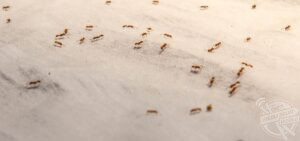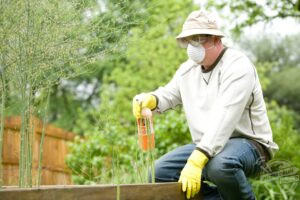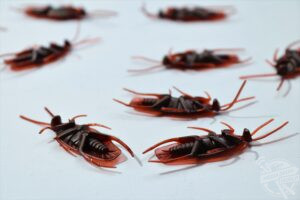
Photo by Anton Darius from Unsplash: https://unsplash.com/photos/YsksmFfCg5E
Pests are an intricate part of our ecosystem, but when they invade our homes, they become a nuisance and, in many cases, a health hazard. Pest control is a crucial component of maintaining a safe and comfortable living environment. It involves managing or regulating species defined as pests—creatures that can adversely impact human activities. Effective pest control is vital as it helps protect homes from unwanted, potentially disease-carrying occupants.
Common Pests Found in Homes
The types of pests people might encounter in their homes vary by region and environment. However, some of the most common household pests across a multitude of climates include ants, cockroaches, mosquitoes, rodents, termites, and bed bugs. These pests not only cause discomfort but can also carry diseases or cause significant damage to your home.
The Importance of Regular Pest Control
Pest control is critically important from a health perspective. Many pests carry diseases that can be transmitted to humans, posing serious health risks to inhabitants of infested homes. For example, rodents can spread the Hantavirus, salmonellosis, and even the plague. Cockroaches can carry E. coli and salmonella on their bodies, while mosquitoes are infamous for transmitting a host of diseases, including Zika, dengue, and malaria. Therefore, regular pest control is not just about maintaining a nuisance-free home; it’s also about safeguarding the health of you and your family.
Property Damage Caused by Pests
Another crucial aspect of regular pest control is protecting your property. Pests like termites and carpenter ants can cause significant structural damage to your home, often leading to costly repairs. Rodents, such as mice and rats, are known to chew on wires, which can lead to electrical malfunctions or even fires. Hence, regular pest management helps ensure the longevity of your home and belongings, saving you money in the long run.
Common Signs of a Pest Infestation
Spotting the signs of a pest infestation early can make a significant difference in your ability to eliminate the problem quickly and effectively. While the exact signs can depend on the type of pest, the following are some general indicators of an infestation:
- Droppings – One of the most immediate signs of pest infestation is the discovery of droppings. Different pests leave different types of droppings, from small dark pellets (mice and rats) to tiny pepper-like specs (roaches).
- Damaged food packages – If you notice your food packages are torn or seem to be gnawed upon, it could be a sign of pests in your home. Rodents in particular can chew through boxes and bags easily.
- Unusual noises – Hearing strange sounds, especially at night, can also hint at a pest problem. These sounds might include skittering, scratching, or even squeaking noises.
- Foul odors – Certain pests can leave a distinctive odor. For instance, a strong, unpleasant, musty smell might indicate a large roach infestation.
Early detection is key to preventing a full-blown pest infestation. The sooner you identify and address the issue, the less time pests have to breed and establish a stronghold in your home. The longer pests are allowed to occupy your house, the more serious the damage and health risks can become.
Moreover, the costs associated with eliminating pests can drastically increase the longer the infestation goes untreated. Therefore, being vigilant about spotting the signs of pests in your home and acting quickly is incredibly important.
Preventative Measures for Pest Control at Home
Implementing preventative measures is the most effective strategy for pest control at home. Regular cleaning, sealed food storage, and routine inspections can significantly reduce the probability of a pest infestation, ensuring a healthier living environment.
Tips on Cleanliness and Decluttering
One of the most effective prevention methods against pests is cleanliness. Pests are generally attracted to places where they can find food, water, and shelter. Here are some tips:
- Regularly clean up your kitchen, ensuring no food particles are left on the countertop or floor.
- Ensure that your dining area is free from leftovers.
- Store food in tightly sealed containers, especially items like cereal, flour, and sugar.
- Empty your trash bins regularly and make sure they have tight-fitting lids.
- Avoid clutter as it provides great hiding spots for pests. Regularly organize your garage, attic, and other places that can become easily cluttered.
Tips on Proper Food Storage
As mentioned above, pests are generally attracted to food sources. Therefore, proper food storage is crucial in pest prevention:
- Store dry food and pet food in air-tight containers.
- Refrigerate ripe fruits and vegetables, as many pests are attracted to overripe produce.
- Promptly dispose of rotten fruits and vegetables.
- Make sure to tightly seal jars of jams, jellies, honey, and similar products.
The Importance of Regular Inspection and Repair in the Home
Inspect your home regularly for signs of pests. Check common hiding spots like under the sinks, inside cabinets, in the basement or attic, etc. Also, regularly check for and repair any potential entry points:
- Seal any cracks or openings along the walls, doors, and windows.
- Make sure your windows and doors are properly sealed and replace any damaged screens.
- Repair any leaking pipes or faucets as pests are often attracted to moisture.
- Regularly clean and repair gutters to prevent standing water, which can attract pests.
Remember, prevention is always better than cure. So it’s worth taking these steps to stop pest infestations before they start.
Do-It-Yourself (DIY) Pest Control

Photo by the CDC from Unsplash: https://unsplash.com/photos/wz3ijPHvL54
DIY Pest Control methods are cost-effective options that homeowners can implement to keep the pests at bay. Simple actions, such as using over-the-counter products and natural repellents, installing traps, and applying homemade insecticides, can offer significant control over the pest population in your home.
Safe Use of Over-the-Counter Pest Control Products
Over-the-counter pest control products, such as insecticides, baits, and traps, can be effective solutions for minor and occasional pest issues. But while using them, it’s essential to remember a few things:
- Always follow the instructions on the package. Overuse of the product will not necessarily speed up its effects and could potentially be harmful.
- Avoid using these products in areas where children or pets can easily access them.
- Store any leftover products out of reach or in a locked cabinet if you have kids at home.
Use of Natural/Organic Methods
Natural or organic methods can also be beneficial in combating pest issues and can be a safer alternative, especially for those with health concerns or environmentally conscious:
- Diatomaceous earth can effectively deal with a variety of insects. It’s a powder made from fossilized aquatic organisms and can be spread in areas where pests are frequently found.
- Essential oils like peppermint, citronella, or eucalyptus can act as natural deterrents for certain pests.
- Vinegar can repel ants and can be used as a natural cleaning agent.
- Plants like marigolds or herbs like rosemary and thyme can deter a wide range of insects and can be used in gardening for pest control.
Understand that DIY pest control methods are generally for preventing or dealing with minor pest issues. Always reach out to professional pest control services for major infestations to handle the problem effectively and safely.
When to Call in The Experts
While minor pest problems can often be handled with DIY methods, certain signs indicate it’s time to call in professionals. These include the following:
- Dense swarms of flying insects or their shed wings collected in areas of your home
- Large amounts of pest droppings or urine marks
- Severe damage to property, furniture, or food packages
- The presence of nests or large numbers of pests
- Repeated pest sightings, even after using DIY pest control methods, indicating a possible severe infestation
Benefits of Professional Pest Control Services
Professional pest control services have tools, products, and expertise beyond what is available to typical homeowners. Here are some benefits of hiring such services:
- Expert knowledge –They have extensive knowledge about different pests, their behavior, and the most effective methods of extermination.
- Comprehensive treatment – They can provide more intensive pest management and preventative measures that last longer.
- Safer Treatments – Professionals know how to use their products safely, reducing risks associated with various pesticides.
- Time and Money Savings – While there’s an up-front cost, hiring professionals could save you money in the long run by preventing future infestations and reducing potential damages to your property.
Pest infestations should never be taken lightly. If you’re facing repeated or severe infestations, it’s a safe and smart practice to call in the experts for a thorough inspection and treatment of your home.
The Takeaway

Photo by Roger Brown from Pexels: https://www.pexels.com/photo/cockroaches-on-white-background-5149756/
Pest control is an essential aspect of maintaining a clean, safe, and comfortable household. While simple measures such as maintaining cleanliness, decluttering, and proper food storage play a significant role in preventing pests, it’s crucial to stay vigilant for early signs of infestations.
DIY pest control strategies can help tackle minor pest problems, but when an infestation is severe, professional pest control services are highly recommended. They possess the necessary knowledge, skills, and tools for effectively and safely handling serious pest issues.
In the end, proactive pest prevention and control methods can go a long way toward ensuring you live in a pest-free environment. This not only safeguards the physical structure of your home but, more importantly, the health and well-being of you and your loved ones.
Whether you opt for natural, DIY, or professional pest control methods, remember that the fight against home pests is certainly winnable. With the right approach and resources, you’ll be ready and able to keep your home comfortable and pest-free.









